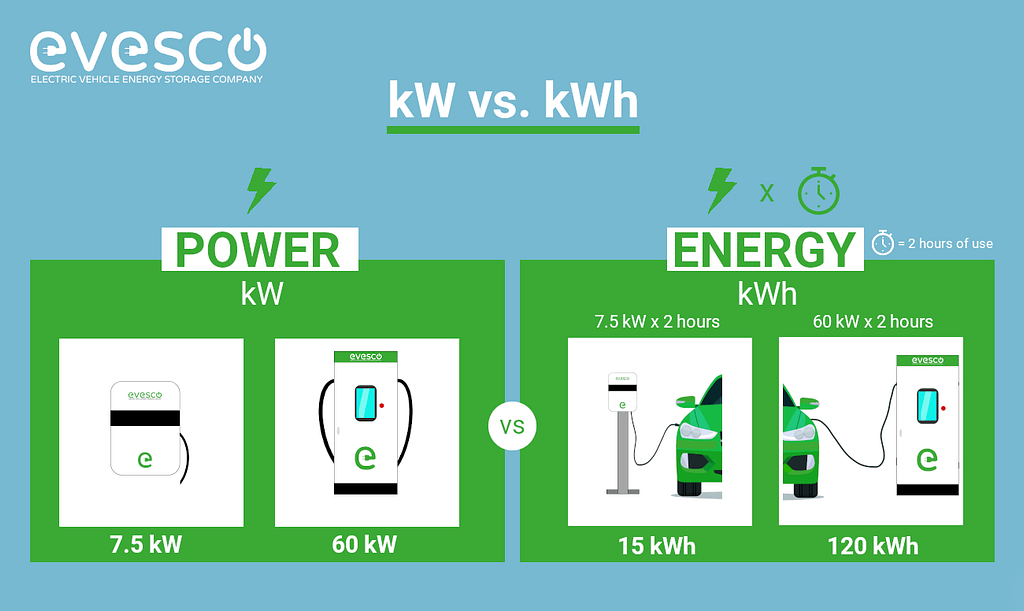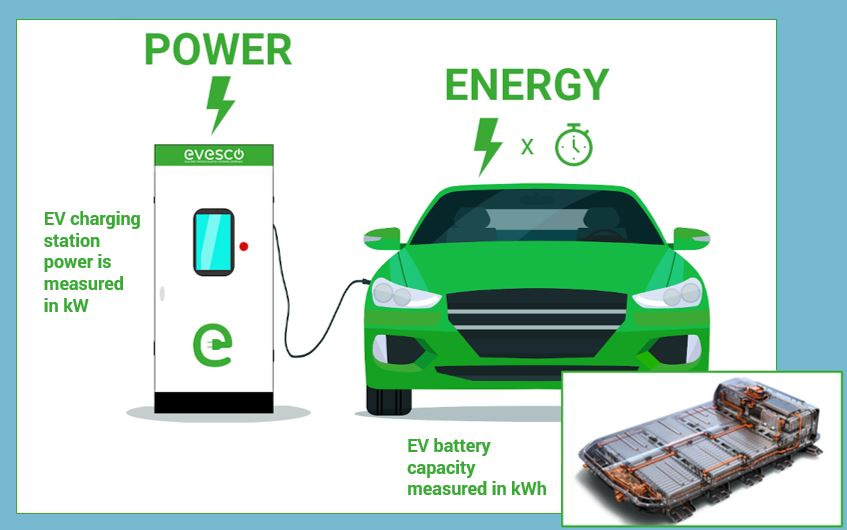Is kilowatt (kW) the same as kilowatt-hour (kWh)? The quick answer is no. Although kW and kWh are related, they are, in fact, completely different. In this guide, we will explain the difference between kW vs. kWh, what they measure, and why it is important to understand the difference.
The Difference Between kW vs. kWh
It is easy to get kilowatt and kilowatt-hours confused as both are connected units of measurement. The important difference between kW and kWh is what they measure. A kW measures power i.e. the rate at which something uses electricity, whereas a kWh measures energy, the total amount of electricity used, or the capacity to use.
To truly understand kW vs. kWh, you also need to consider time. A kWh measures the energy an electrical device or load uses in kilowatts times hours. For example, if you charge your electric vehicle with a 22kW car charger for one hour, you will consume 22 kWh of energy. The equation is (kW x hours = kWh) to calculate kWh.
You can see kW vs. kWh or Power vs. Energy below. In these examples, we show, on the left-hand side, the power in kilowatts of a Level 2 (7.5 kW) and a Level 3 (60 kW) EV charging station. The kW number shows the rate at which these electrical devices consume power. On the right-hand side, you will see the energy consumed by these EV charging stations during a defined period of time, in this example 2 hours. Using the kWh equation (kW x hours = kWh), we can calculate the total energy consumed (7.5 kW x 2 hours = 15 kWh).

Let’s quickly summarize kW and kWh.
What is a kW (kilowatt)?
A kW or kilowatt is a unit of measurement for the rate of power an electrical device or load uses. The higher the kW of a device, the more electrical power is needed to operate it. A kilowatt is 1000 watts (W).
1000 W = 1 kW
What is a kWh (kilowatt-hour)?
A kWh or kilowatt-hour measures the energy usage of an electrical device or load. The higher the rate of power (kW) of an electrical device and the longer it is used (hours), the more electricity it consumes (kWh).
Let’s look at some examples of kW vs. kWh about both low and high-power electrical devices and see how they affect each other.
If you use a low-powered electrical device such as a 65-inch LED TV, which needs 100 watts (0.1 kW) of power, you can use it for ten hours before consuming 1 kWh of energy. On the other hand, if you are operating a 60 kW DC fast EV charger, you will consume 1 kWh of energy within one minute.
| Electrical Device | Power (kW) | Usage (hours) | Energy Consumed (kWh) |
|---|---|---|---|
| 65-inch LED TV | 0.1 | 10 | 1 |
| Air conditioning | 2.5 | 1.5 | 3.75 |
| Home EV charger | 3.5 | 10 | 35 |
| Level 2 EV charger | 22 | 8 | 176 |
| DC fast EV charger | 60 | 0.5 | 30 |
Why is it Important to Know the Difference Between kW and kWh?
Understanding the difference between kW and kWh is essential for any business looking to monitor and manage its electricity usage. It is also crucial for any business looking to introduce EV charging, as utility companies typically charge for energy consumption in kWh and peak power demand in kW. Knowing when and at what rate electricity is being consumed can enable businesses to reduce their overall electric bills.
kW and kWh in Relation to Electric Vehicles
When it comes to Electric Vehicles (EVs), it is essential to know the difference between kilowatts and kilowatt-hours. An EV stores the electricity to propel itself in a battery; this battery is sized in kWh. Different EVs will have different-sized batteries; for instance, the Ford F-150 Lightning Pro has a battery capacity of 98 kWh, and the BMW i4 eDrive35 has a battery capacity of 70.2 kWh. While the battery of an electric vehicle is measured in kWh, the power needed to charge it is measured in kW. As a general rule, the higher kW (power) of an EV charger, the quicker its ability to charge the EV battery. However, when it comes to charging an electric vehicle, there are several variables to consider, including the EV charging level, EV charge acceptance rate, and size of the battery, all of which affect the time it takes to charge.

So, to summarize, in the EV world, kWh refers to the size/capacity of the battery, and kW refers to the power used to charge that battery. EV chargers are sized in kW, and the amount of time they are used will determine the energy consumed via the EV charger and delivered to the EV battery in kWh.







